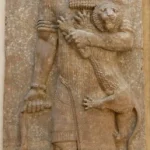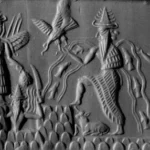In today’s post, I would like to analyze the famous “seven days of creation”, in which the supreme God (according to the Bible) created the earth and all things, including man, in 6 days, and rested on the seventh. We still use this seven-day week system today, but does it really come from the Bible? It may have been borrowed from older accounts, and the oldest ones come from ancient Sumer.
And what does one of the oldest written accounts, discovered in present-day Iraq, known as Sumer, say about this?
The third tablet written by the God Enki or his scribes, the thread of which I began with the story of the creation of the Earth, will come to our aid.
“This is the account of how Eridu (home away from home) was established on Earth, how the count of seven days began.”
The third tablet describes the arrival of the Anunnaki on Earth, under the command of Ea, son of Anu, and the seven-day system of creation:
1. On the first day, after landing on Earth, they set up a temporary camp
2. On the second day, they separated the waters that were not fit for drinking from the fresh waters, creating canals and causeways
3. On the third day, they examined the plants, herbs and fruits that were fit for eating according to their kind, providing water and food for the newcomers
4. On the fourth day, they brought tools from the ship, made bricks and built the first permanent buildings
5. On the fifth day, they built a boat of reeds, measured the marshes, created ponds in which they kept fish for breeding and fish traps
6. On the sixth day, they surrounded the camp with a brick wall, which was to protect them from dangerous game; they also brought from the ship “a ray that kills” and “a speaker who gives words”.
7. On the seventh day, they decided to rest. “This day will be a day of rest. The seventh day shall always be a day of rest in the future.”
The story written on the third Enki tablet, much older than the biblical, and Babylonian Enuma elish, provides information about the first week of work that the Anunnaki performed after landing on Earth about 450,000 years ago.
The Enuma elish seems to be a copy of Enki’s tablet, which was normal at the time, because copyists copied older texts, changing or interpreting the source.
The biblical story was created on the basis of older accounts, so it could have been a Babylonian or Sumerian text, with many changes.
All these stories are strictly allegorical in my opinion, I doubt that six days were enough to create Earth and everything on it. I also doubt that the Anunnaki built a settlement in six days, created embankments in the swamps, catalogued plants, fish and animals, built a kiln to bake bricks from which they built houses and the entire settlement.
The entire system of seven days of creation is probably an abbreviated version of a larger story of creation, for which the authors did not have enough time or space to record it in full. It is possible that such a story was written down, but has not survived to our times.
The most important issue in today’s considerations is the convergence of the motif of seven days of creation, together with the last day, which became a day off from work until today.
Do my comparisons and reflections make sense? As always, everyone must answer this question for themselves.
See also:
https://en.wikipedia.org/wiki/Genesis_creation_narrative
https://en.wikipedia.org/wiki/En%C5%ABma_Eli%C5%A1






even you drop off informations from the book of enki, its really interesting what sumerian left written for us